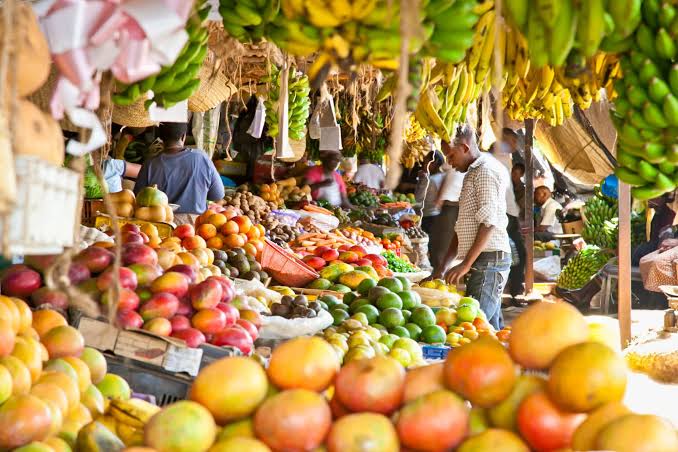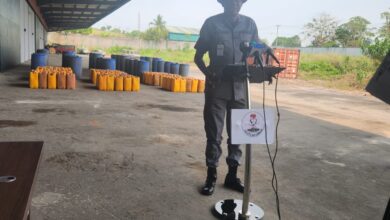Pesticides, GMOs Dangerous to Future of Nigeria’s Food Security, HOMEF Insists
Flays non-representation of civil society on NABDA D

By Edu Abade
Continuous patronising of pesticides and Genetically Modified Organisms (GMO) crops pose a serious threat to the availability, sustainability and future of food, as well as its security in Nigeria.
The Health of Mother Earth Foundation (HOMEF) made the assertion during its Dialogue with Decision Makers on Pesticide Hazards and the Need for a Holistic Food Policy for Nigeria in Abuja on August 16, 2023.
In his welcome address tagged: At The Crossroads Of Our Food Future, Executive Director of HOMEF, Nnimmo Bassey, lamented that the colonialism of Africa was evident in the plunder of natural resources, subjugation of markets and productive sectors to the needs and interests of few corporate profit-driven entities.
His words: “One of the targeted areas of exploitation is food systems through the propagation of false narratives, disruption of local economies, manipulation of policies and entrenchment of agricultural models that mostly serve the interests of the seed and food business monopolies.
“Food is at the centre of our socio-cultural wellbeing. It is part of the ceremonies of life. The conceptualising of food as a tool for accumulation of capital and for the control of a few individuals and corporations has brought major disruptions that have little regard for human and environmental costs.
“The notion of accumulation saw food as an object for trade and focused on increased higher profits which inexorably led to the erosion of nutritional and biological diversity, degradation of soils and dismantling of support systems for local food producers. This mindset that disconnects the producers from consumers drives the industrial model of agriculture that relies heavily on pesticides–herbicides, fungicides, insecticides and other agrotoxics.”
He noted that a recent report by Alliance for Action on Pesticides in Nigeria (AAPN) highlighted that Nigeria remains one of the largest importers of pesticides in Africa by volume with importation of 147,477 tons in 2020 and that in 2018 the country spent about $384 million on importation of pesticides according to the Food and Agriculture Organisation (FAO).
He added that globally, about two million tons are used per year with many of them designed to accompany genetically modified seeds produced by the same companies that produce the pesticides.
“In the US, more than 90 percent of corn, soybeans and cotton grown are genetically modified to be resistant to herbicides. Shockingly, up to 80 percent of the pesticides used in Nigeria are classified as Highly Hazardous Pesticides (HHPS) and 40 percent of those produced in the country have been banned in European countries.
“One of the most worrisome aspects of pesticide use is the impact on the environment with their ability to leach into the soil and contaminate groundwater, leading to long-term damage to ecosystems; destruction of beneficial insects, disruption of pollination and damage to soil microorganisms that are vital for maintaining healthy soils.
“The indiscriminate use of pesticides has led to the emergence of resistant pest populations, which further escalates the need for stronger chemicals and intensifies the cycle of destruction,” he said.
Nnimmo further explained that the consequences of pesticide exposure on human health must not be overlooked, adding that in Nigeria, pesticide poisonings have become a regular occurrence, while a key case that could not be forgotten is the pesticide poisoning, which claimed nearly 270 lives in Benue State where their water source was contaminated with Endosulphan.
“Most of the pesticides used by Nigerian farmers contain active ingredients linked to cancer or proven to be carcinogenic, including Glyphosate, Atrazine, Butachlor, Chlorpyrifos, Dichlorvos (DDVP), Endosulfan and Mancozeb. Farmers have reported health problems like difficulty in breathing, dizziness, headaches, nausea, vomiting, eye problems, skin rashes, catarrh, acute diarrhoea and respiratory problems linked with their use of pesticides.
“In addition to the deleterious human and environmental health impacts, the dependence of inorganic pesticides in Nigeria has serious implications for our economy. Export markets are closing against us because of pesticide residues above allowable standards.
“There is also the wrong notion of overemphasis on food security at the expense of food sovereignty. While food sovereignty demands that agricultural production suits the culture, environment and needs of the people, food security is concerned with placing any sort of food on the table. The truth, however, is that food security can best be attained under the atmosphere of food sovereignty,” he stated.
He also pointed out that one of the results of arguments often posited is that food security could only be achieved with the adoption of modern agricultural biotechnology, adding: “We note that GMOs are mostly engineered to withstand dangerous herbicides which kill other varieties except the engineered ones.
“Other crops are genetically engineered to act as pesticides and kill identified pests that would otherwise attack the crop or seeds. Examples include Bt Cotton and Bt Cowpea or beans approved for commercial release in Nigeria. The implication of eating a seed engineered to kill a pest is that you are eating a pesticide.
“The hope of dominating the Nigerian and African markets and generating billions of US dollars is bound to turn into a pipe dream as nations who do not endorse genetically modified crops will not accept the beans unless we wish to further make capital on the opacity in the handling and trading of these and other seeds.
“GMOs are not the solution to food insecurity. After almost three two decades since their introduction, they have not eradicated hunger. Rather, they lock in the system that promotes hunger by degrading soils, reducing biodiversity, disregarding the knowledge of local food producers, and concentrating power in the hands of a few market players.”
He recommended that liberating Nigeria’s food system requires independent development of policies and laws that serve the interests of the people; recognise and promote local knowledge and experience, as well as safeguard human and environmental health, while strengthening the national economy.
“We have a National Biosafety Management Agency (NBMA) Act which ought to safeguard human and environmental health from the risks associated with GMOs, but instead the law is fraught with several lacunas that allow the free movement of these products.
“Some of the gaps in the Act are evident in the areas of risk assessments and management; access to information; public consultation and participation; liability and redress; labeling and the right to know; decision‐making, as well as appeals and reviews,” he added.
Nnimmo, who pointed out that the composition of the Governing Board of the agency was arbitrary and constitutes conflict of interests, cited the National Biotechnology Development Agency (NABDA) which is the major promoter of the technology sits on the board, without adequate representation of civil society, farmers and consumers.
“NABDA should not be on the board since it is their conduct, technology and products that the law aims to regulate. Sadly, Nigerians have been ambushed to plant and eat what they do not know mostly because of their trust in government agencies. We cannot afford to use our people as guinea pigs simply to score points for adopting risky technologies. The Precautionary Principle, a key principle in biosafety management, requires that we pause where there are doubts and uncertainties. This is one time when we should.
“Nigeria is obviously at several crossroads at the moment. This gathering with key policy makers affords us the opportunity to look closely at the food crossroads and our food future. As we consider the issues of pesticides use as well as the adoption of modern biotechnology in agriculture, we will chart the path toward the development of a holistic food policy for Nigeria,” he stated.











